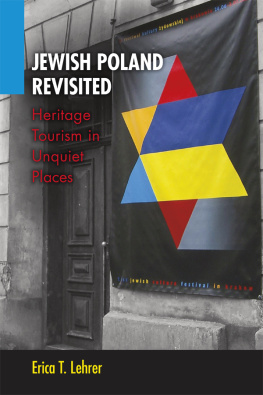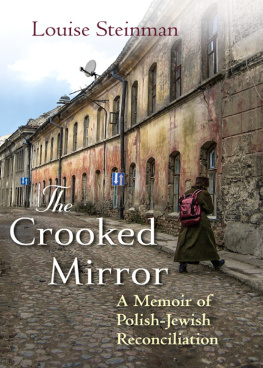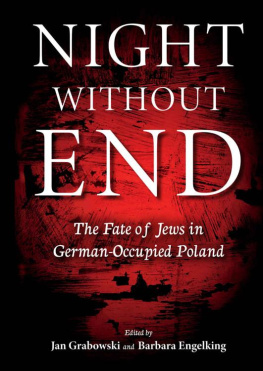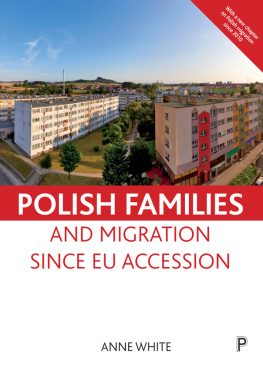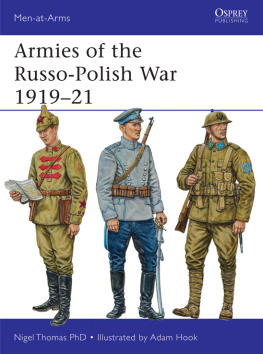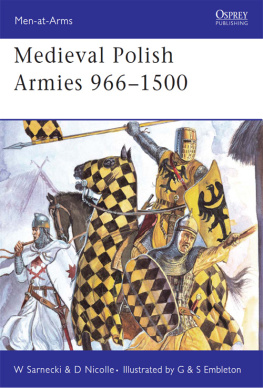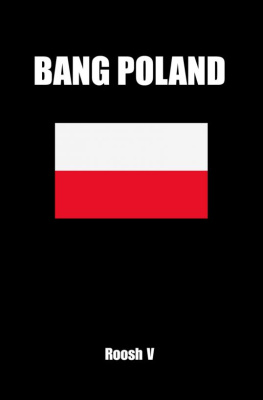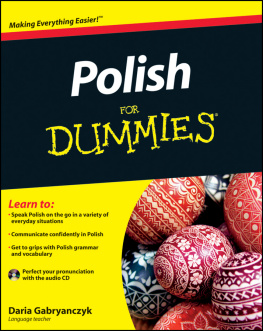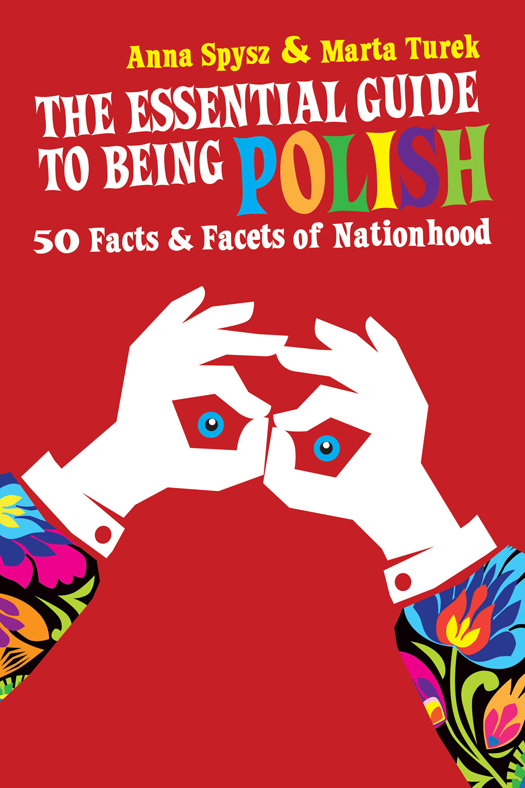ALL RIGHTS RESERVED. No part of this book may be reproduced or transmitted in any form or by any means, electronic or mechanical, including photocopying and recording, or by any information storage or retrieval system, without written permission from the publisher except in the case of brief quotations in critical articles and reviews.
Cataloging-in-Publication Data is available from the Library of Congress.
written by Anna Spysz.
written by Marta Turek.
All translations by the respective authors unless otherwise noted.
F OREWORD
Poles have the Freedom Gene
When I think about what common denominator could be used to describe Poland, the Polish people, and the Polish soul, I come to the conclusion that, regardless of the time period or historical and political circumstances, what connects and defines us Poles is the freedom gene.
The Polish freedom gene is encoded somewhere deep within us and passed on from generation to generation. In the days of occupation it ordered us to take up independence missions, sometimes even hopeless ones, and in times of democracy it teaches us how to deal with the freedom we have won. And if we look at our homeland after more than twenty years of political transformations, we can see that we are doing quite well, that we are building a modern country that is open and prosperous, even if it is not free of problems.
It was the Polish freedom gene that in 1980 brought about the birth of the Solidarity movement among many millions of people, which not only allowed us to introduce systemic changes in Poland, butfollowing the voice of our great compatriot, the blessed John Paul IIalso helped us renew the face of the land in Europe and even in the world. It was in turn this Solidarity message that, carried to the world, came upon fertile groundas it entered the hearts of many people and nations for whom the freedom gene has for generations been a constant point of reference.
I believe that today the same freedom gene will lead us in building a free world that is based on moral values, human solidarity, and peace. And it will not allow us to fully experience inner peace for as long as the desire for freedom has not been fully satisfied in any corner of the world.
I invite you on this journey into the depths of the Polish soul as described on the pages of this book. And I invite you to Polanda land of freedom and solidarity.
Lech Wasa, cofounder of the Solidarity movement, Nobel Peace Prize laureate, former president of Poland (19901995)
P REFACE
Were talking about Poland. Nothing is usual there.
Andrzej Sapkowski, Polish fantasy writer
The Essential Guide to Being Polish is just that: a guidebook for the lapsed Pole, non-Pole living in Poland, or anyone remotely interested in Polish culture, history, and the essence of Polishness. Within its pages is a cursory introduction to the long and often turbulent history of Poland, and how it has affected everything from the arts to where Polish populations reside to modern economics in the country. It is an attempt to answer an impossible question: What is the essence of being Polish?
This book is not intended to be read cover to cover, but rather each chapter is a self-contained piece of the Polish puzzle. This is why certain themes are sometimes repeated, and other chapters are frequently referenced as background material. No extensive knowledge of Polish or European history is required, though those with little exposure to Poland should start with the first four chapters. The Essential Guide to Being Polish is not an instruction book that will teach readers how to be Polish, though it might give aspiring citizens a head start. It is aimed not at scholars, but rather anyone with an interest in discovering what makes Poland and its people, well, Polish.
This book is also not an academic work, though care has been taken to ensure that the most up to date figures and accurate historical accounts have been presented. In writing this book, the authors relied on their own knowledge, expert opinions, anecdotes, and their personal experiences of being Polish and living in Poland as well as being a part of Polish communities abroad. Each chapter contains a further reading section, provided for those who would like to dive deeper into a particular topic. Though many of those books have been used as reference materials, the lists are not bibliographies, just suggestions. The authors hope that their introduction to these essential aspects of Polishness will whet the appetites of readers and encourage them to read more about Poland, and if possible, travel through Poland to experience this enigmatic land for themselves.
A CKNOWLEDGMENTS
Anna Spysz would like to thank Nick Hodge and Piotr Krasnowolski for their incredibly helpful feedback on initial drafts, Dara Bramson, Marek Kamiski, Phil Manchester, and Duncan Rhodes for help with individual chapters, as well as all of her male Polish friends who offered much-needed assistance in writing . Above all, she would like to thank her parents, who kept the language and spirit of Poland alive far away from Polish lands, her friends and family in Poland and elsewhere for their steady encouragement, and Kevin Hudson for his unending support.
Marta Turek would like to thank Kazimierz Turek for providing extensive comments on Polish history, Anna Mojska for her insightful remarks on Poland in general, and friends and family far and wide for their unlimited support and inspiration.
Both writers would first and foremost like to thank Paul Olchvry for giving us this chance to tell the story of the Polish people, as well as Tomasz Jankowski and Professor Emeritus Thaddeus V. Gromada for taking the time to read earlier versions of the manuscript and offering their scholarly advice.
We especially wish to express our deepest gratitude to the former president of Poland, Lech Wasa, for promulgating the Polish spirit of freedom and solidarity and for his utmost support in our endeavor.
Anna Spysz, Krakow, February 2013
Marta Turek, Rokietnica, February 2013
A B RIEF T IMELINE OF P OLISH H ISTORY
966Christianity introduced to Poland by Mieszko I
1025Bolesaw the Brave is crowned the first Polish king
13331370Casimir the Great unites Poland, with Krakow as the capital
1364Jagiellonian University founded
1410Battle of Grunwald fought between Polish and Lithuanian forces and Teutonic Knights
1543Nicolaus Copernicus publishes On the Revolutions of the Celestial Spheres
1569Union of Lublin signed, creating the PolishLithuanian Commonwealth
15961609Polands capital moved from Krakow to Warsaw
1655-60Swedish Deluge destroys Warsaw and much of Poland
1772First Partition of Poland
1791Adoption of the Constitution of the Third of May
1793Second Partition of Poland
1795Third Partition of Poland
1830November Uprising against Russian rule
1863January Uprising against Russian rule


